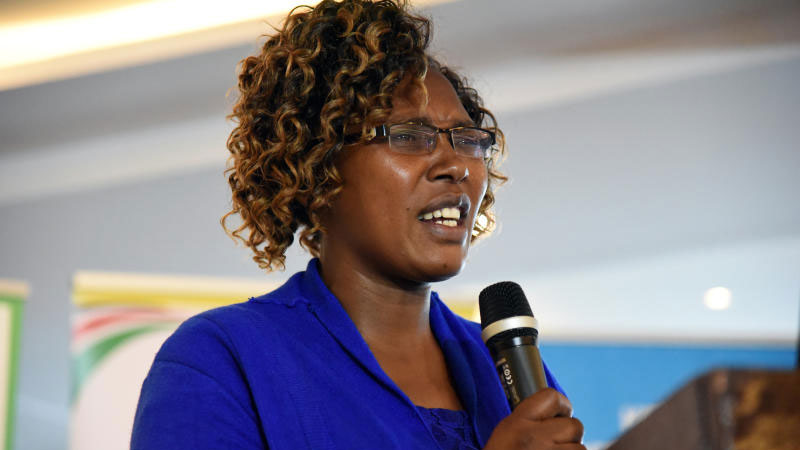
A routine power blackout on April 14 triggered a chain of events that would end in the death of Martha Njoki's daughter.
That morning, power tapped from an illegal connection went out and her daughter, Joyce Wangeci, had breathing complications as she relied on an oxygen concentrator machine.
Joyce, 12, was still recuperating at their home in Embakasi after five months at Kenyatta National Hospital where she had been admitted with multi-drug resistant tuberculosis (MDR-TB).
She had been discharged in January but the disease had eaten up her lungs and weakened her heart due to strained breathing.
Martha then turned on a generator bought specifically as back-up in case electricity to power her daughter’s oxygen concentrator machine went off.
She dashed to a nearby church where there was power, but the congregants were not compassionate enough.
It took a trip to recreation centre where youth played pool for Wangeci to be assisted. Her mother called a doctor who examined her and pumped glucose into her disappearing veins before insisting that she be referred to the Kenyatta National Hospital.
But on arrival at the emergency care, she was pronounced dead. TB had snuffed out the life of her child and left the vegetable vendor with a Sh1.2 million hospital bill. The Health ministry intervened to have it waived because she did not have a National Hospital Insurance Fund card.
This was not counting all the diagnostic and medicine charges she went through since her journey began almost a year earlier at Mama Lucy where her daughter was wrongly diagnosed with pneumonia. She had solicited funds from all the avenues she came across.
“Now I have an oxygen machine I bought at Sh120,000 and a Sh7,000 generator that I do not know what to do with,” Njoki told the audience during the launch of The Kenya First National TB patient cost survey.
Ms Njoki is just an example of thousands of TB patients and their care givers who have been driven into poverty by exorbitant costs related to the disease despite the drugs being free according to the latest report by the Ministry.
Findings of the survey released on Wednesday revealed that on average, a patient like the late Joyce diagnosed with resistant TB would have spent at least Sh145,110 in expenses like diet and transport during the course treatment.
For those with Drug Sensitive TB (DSTB), they will spend Sh25,870. It takes at least 20 months to treat resistant TB with the first eight month demanding that the patient avails themselves at the hospital for a daily injection.
A new regiment of drug however is in place that will have such TB cases treated in just nine months. For DSTB, it takes six months.
According to the report, presented by Eunice Mailu who is in charge of Social Protection in the National TB programme, in 2017 there were 85,188 cases of drug sensitive TB and 577 cases of drug resistance TB. In the group, there were 7,000 children.
Most of those affected are individuals between the age of 15 and 34 which was noted to be influenced by increased HIV cases in this age group.
At least 62.5 per cent of the patients lost jobs in the period of their treatment for resistant TB and 39.1 per cent for disease sensitive TB.
Additionally, according to the report, 27.8 per cent of the patients devised coping strategies which included selling personal property, dipping their hands into their savings and taking loans. This is while 27.1 per cent faced food insecurity.
Mailu said though TB drugs might be offered free in government institutions, patients still incur huge expenses in terms of transport, diet, and diagnostic charges like X rays which are not in NHIF.
“We need to include TB in the Universal Health Care Package. But first we need to increase coverage of TB patients to NHIF who are just at 13.6 per cent,” said Mailu.
Mailu said the package should include other elements of TB care.
“We have patients who have collapsed lungs, or hearing loss as a result of the injections and may require rehabilitation and others who are admitted for even six months. Such eventualities are not under NHIF,” she said.
Health Cabinet Secretary Sicily Kariuki has vowed to ensure that TB care is included in the NHIF benefit package and that all households affected are linked to existing social protection and food security programmes.
“My ministry will ensure that TB patients do not incur any diagnostic and treatment costs and that the ministry will look into providing cost free chest x rays services,” said Kariuki.
 The Standard Group Plc is a multi-media organization with investments in media platforms spanning newspaper print
operations, television, radio broadcasting, digital and online services. The Standard Group is recognized as a
leading multi-media house in Kenya with a key influence in matters of national and international interest.
The Standard Group Plc is a multi-media organization with investments in media platforms spanning newspaper print
operations, television, radio broadcasting, digital and online services. The Standard Group is recognized as a
leading multi-media house in Kenya with a key influence in matters of national and international interest.











